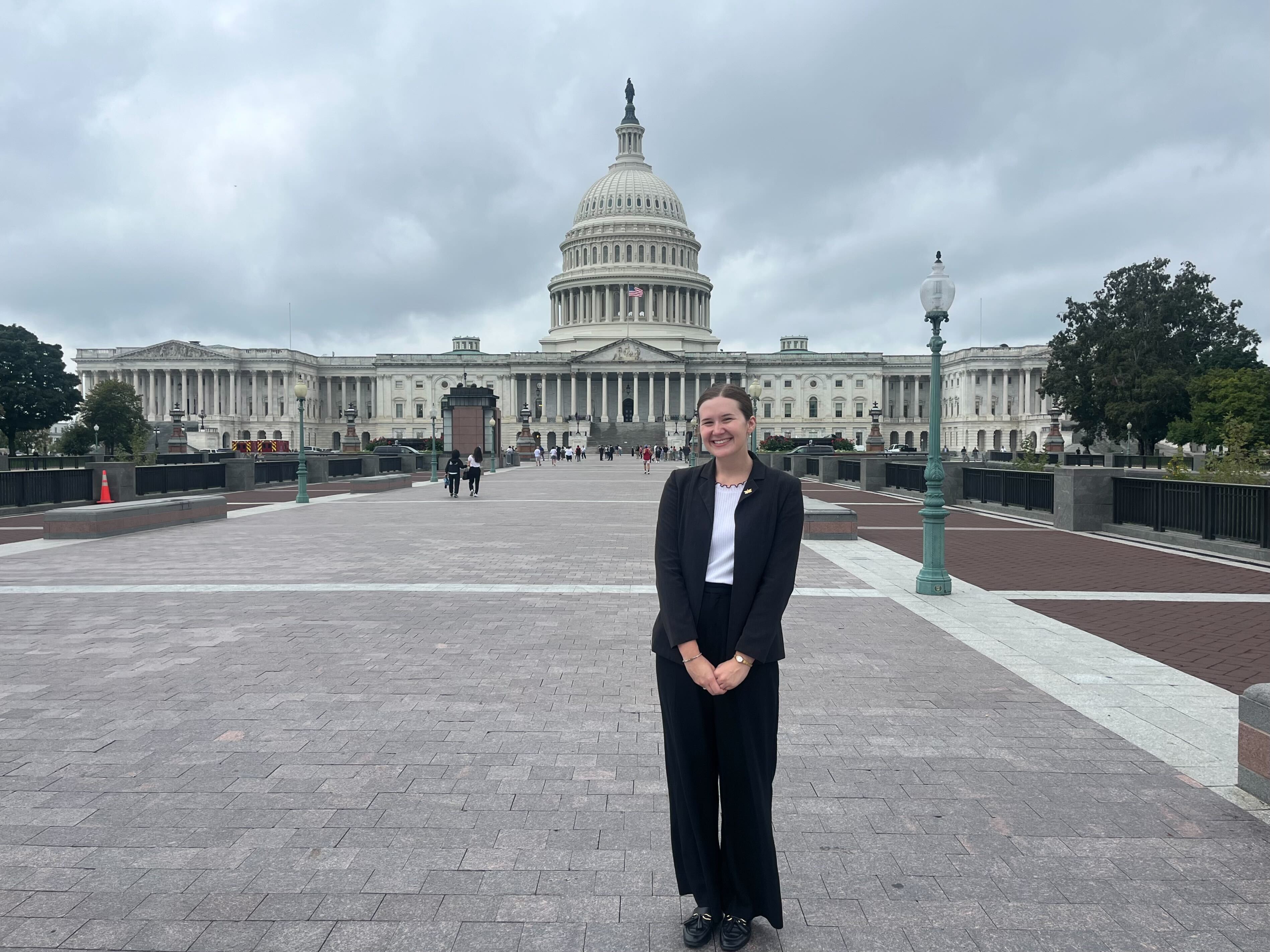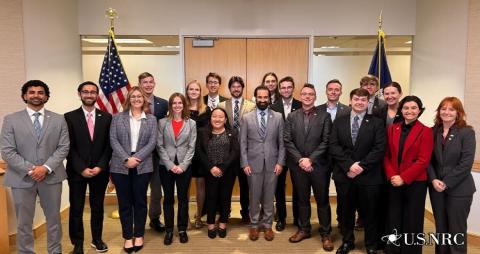Q&A with Audrey Miles: A Graduate Student’s Journey to Washington, D.C. With the Nuclear Engineering Student Delegation

Ph.D. student Audrey Miles stands in front of the U.S. Capitol in Washington, D.C. Miles was part of the Nuclear Engineering Student Delegation and travelled to the nation’s capital to advocate for science-backed legislation.
Second-year chemistry Ph.D. student Audrey Miles shares her experience participating in the Nuclear Engineering Student Delegation in Washington, D.C. From engaging with top policymakers at the White House to advocating for science-backed legislation on Capitol Hill, Miles reflects on how her scientific background shaped her approach to policy discussions and deepened her understanding of science advocacy. Her journey highlights the vital role scientists can play in shaping the future of nuclear energy and public policy.
SoPS: Can you tell us a bit about yourself and your research interests at UC Irvine?
Miles: I am a second-year Ph.D. student in the Department of Chemistry at UCI. I am a member of Prof. Sarah Finkeldei’s nuclear materials chemistry research group, where I use machine learning to improve simulations of advanced nuclear fuels on the atomic scale.
SoPS: What is the Nuclear Engineering Student Delegation, and how did you become involved?
Miles: The Nuclear Engineering Student Delegation (NESD) is a program intended to provide students in the nuclear sciences an opportunity to interact with the political process. Each year, the delegation travels to Washington D.C. to formulate a policy statement and discuss the future of nuclear energy, education, and research with governmental and industrial leaders. I applied to be part of the delegation after it was announced during an American Nuclear Society meeting.
SoPS: What were some of the key goals of the delegation’s visit to Washington, D.C.?
Miles: NESD aims to express the views of students aiming to work in the nuclear industry. As students, a key focus of our policy statement this year included continued federal research funding across a broad range of disciplines and fostering robust workforce development programs, particularly in community colleges and vocational schools. Other pieces of legislation that the delegation endorsed intend to streamline the regulatory processes to license nuclear technologies, foster international relations to export U.S. technology, enable the construction of facilities for nuclear waste storage, and incentivize investment in the nuclear industry.

SoPS: What was it like visiting the White House and meeting with congressional fellows? Any moments that stood out?
Miles: Throughout the week, we workshopped our policy statement with a number of federal agencies, NGOs and think tanks, and nuclear start-ups in Washington. These conversations culminated in two days spent sharing the policy statement with Congressional representatives on Capitol Hill.
Our meetings with the Nuclear Regulatory Commission (NRC), the Department of Energy - Office of Nuclear Energy (DOE-NE), and the White House Office of Science and Technology Policy (OSTP) left a lasting impression on the delegation as a whole. We had the opportunity to speak with NRC Commissioner Matt Marzano, DOE Assistant Secretary of Nuclear Energy Ted Garrish, and the Principal Assistant Director for National Security and International Affairs at the OSTP. Most of our meetings consisted of the delegation asking experts questions to gain more insight into the current conversations surrounding nuclear policy in Washington. However, during our meeting in the White House, the conversation shifted towards asking the delegation what we thought was most crucial to the growth of the nuclear industry in the coming years. It was surreal to be asked, “what did we miss in the executive orders?” and engage in genuine conversation with the policymakers who have the power to enact real change in our energy, research, and technology landscapes.
I also really enjoyed our meetings with California Senate and House offices. While conversations about policy issues on the national scale were incredibly enriching, it was special to meet with the lawmakers representing Irvine, Orange County, and California to discuss issues that are closer to home.
SoPS: How did your scientific background influence the way you approached policy discussions during the trip?
Miles: As we discussed certain pieces of legislation with policymakers throughout the trip, we were able to offer our technical knowledge to contextualize why those laws would be beneficial or detrimental to the industry. Having researched scientific questions in nuclear waste management and fuel performance, I was able to answer questions for policymakers who are responsible for making legislative decisions in those areas.
SoPS: What did you learn about science advocacy and communication through this experience?
Miles: Throughout the week, I learned about the significance of solution-oriented science advocacy and communication. I came into the delegation with views on what I believe are the most important current issues in nuclear technology and research. However, those views mean little to policymakers unless they are substantiated by concrete actions that they can take within their own jurisdiction. In preparing a policy statement to share with Congressional offices, it was much more effective to focus on pieces of legislation that have already been introduced in the Senate or House as opposed to making abstract recommendations about needs in the nuclear field. For example, by pointing towards a bill that explicitly addresses bottlenecks in the licensing process for new nuclear reactors rather than nebulously calling for “regulatory reform,” Congress members have a much more straightforward pathway to enact productive change.
Participating in NESD also opened my eyes to the differences between policy and politics. Because we were focused on bipartisan advocacy for the common goal of deploying clean nuclear energy, we learned throughout the week how to communicate our priorities in ways that resonate “across the aisle.”
SoPS: Were there any challenges you faced during the trip, and how did you overcome them?
Miles: Drafting the policy statement was incredibly instructive in the collaborative nature of policymaking and the prioritization of interests among a group of people. As delegates, we all came with different expertise, and therefore, different priorities. Even so, we shared the objective of writing a concise document expressing all of those priorities. We spent a number of hours refining this statement, and it was occasionally a challenge to make sure all voices were heard. Ultimately, after much debate about even the most nuanced turn of phrase, we had created a document that we were all proud to share with Congress members.
SoPS: How has this experience shaped your perspective on the role of scientists in public policy?
Miles: My NESD experience demonstrated the wide variety of roles that scientists can play in the public policy sphere. Whether it is offering expertise to lawmakers, working for an NGO that drafts legislation, or joining a federal agency that facilitates technological innovation, individuals with scientific backgrounds are crucial to the success of the “policy machine” at all levels. Ultimately, scientific advancement is intimately entwined with the policies that facilitate everything from research funding to supply chain management.
SoPS: What advice would you give to other students who are interested in science policy or advocacy?
Miles: Participating in NESD showed me that participating in science policy and advocacy is incredibly accessible, especially as a student at an institution like UCI. As part of the delegation, I was responsible for arranging my meetings with Congressional offices. I was originally intimidated by this task, feeling that arranging such meetings would be out of reach as a constituent with no explicit connections. However, the UCI Federal Government Affairs Office facilitated these connections with members of Congress and was an excellent resource for engaging with policymakers. If you are interested in science policy and advocacy, it is worthwhile to tap into these resources and seek out programs like NESD where you can get involved! There are also plenty of opportunities at the local level, such as attending city council meetings.
SoPS: What’s next for you — academically, professionally, or in terms of advocacy?
Miles: I will be returning to Washington, D.C. next year as a vice chair for the Nuclear Engineering Student Delegation! I am excited to play a role in facilitating this opportunity for other students hoping to get involved in nuclear policy. As I continue my PhD, I am also hopeful that my research questions will be influenced by the intersection of nuclear science and technology policy. I am more interested than ever before in leveraging my scientific expertise to work on policies which facilitate funding and support for clean energy technologies.
